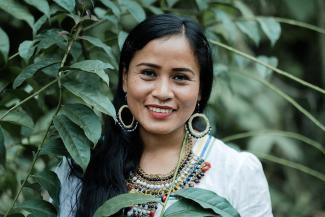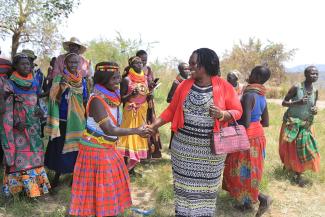USAID supports women in northern Kenyan community conservancies to improve wildlife conservation, create economic opportunities, and promote peaceful coexistence among communities. Credit: Davide Mutua, USAID Kenya
Indigenous Peoples total more than 370 million globally and represent a diversity of geographic locations, cultural identities and traditions, and other socio-economic and political dynamics.
Mission Statement
Our objectives are to strengthen USAID’s engagement with Indigenous Peoples to ensure development programs align with their development priorities, safeguard against unintended harm, and to empower Indigenous Peoples to exercise their rights, participate in decision-making processes that impact them, and practice self-determined development. We achieve these objectives by research and learning from past experiences; piloting innovative models of consultation and collaboration; disseminating best practices; and helping other stakeholders, including host-country governments, to take a transparent and accountable approach to working with Indigenous Peoples.
USAID Policy on Promoting the Rights of Indigenous Peoples
USAID’s Policy on Promoting the Rights of Indigenous Peoples (PRO-IP) sets a new standard for engagement and partnership with Indigenous Peoples, improving the measurable impact and sustainability of USAID’s programs by ensuring that our staff and implementing partners engage Indigenous Peoples as equal partners in development processes. The Policy safeguards against harm; and enhances the ability of Indigenous Peoples to protect their rights, determine their own priorities, and advance their self-determined development and self-reliance.
PRO-IP also recognizes the value of Indigenous Peoples’ own decision-making processes, expertise as environmental stewards, and visions for development; and recognizes that they can be critical partners with USAID in the conservation of cultural and natural resources. PRO-IP builds on USAID’s experience in supporting Indigenous Peoples’ rights, consistent with our strategic approach to empower individuals and build communities through helping governments, civil society, and the private sector on the Journey to Self-Reliance. PRO-IP identifies four development objectives:
- Strengthen engagement with Indigenous Peoples to safeguard against harm and support their development priorities and self-reliance;
- Increase the integration of Indigenous Peoples’ concerns across all sectors of USAID’s portfolio of investments and promote cross-sectoral development approaches;
- Empower Indigenous Peoples and their representative organizations to advocate for, and exercise, their rights and practice self-determined development; and
- Foster an enabling environment for Indigenous Peoples to advocate for, and exercise, their rights.
How PRO-IP Builds on USAID’s Innovative Strategies to Strengthen Self-Reliance
- USAID/Paraguay supported legal registration and identification of 24,026 individuals in 237 Indigenous Peoples’ communities, providing access to basic services including health and education, improved livelihoods, and food security.
- USAID/Peru provided targeted support for 10 Indigenous Peoples’ organizations across the Amazon Basin (Brazil, Colombia, Guyana, Peru, and Suriname).
- USAID/Southern Africa implemented the Advancing Rights in Southern Africa (ARISA) program that focuses on Indigenous Peoples in Angola, Botswana, Lesotho, Namibia, and South Africa.
- USAID/Nicaragua built the capacity of the 17 legally recognized Indigenous and Afro-Descendent territorial governments and 18 Indigenous Peoples’ communities of the Northern Caribbean Coast to use advanced technology to combat land grabs, resource exploitation, and other rights violations.
- USAID/Democratic Republic of Congo’s Central Africa Regional Program for the Environment conducted an in-depth assessment to enhance the engagement of Indigenous Peoples in programming, and to reduce the threat of the commercial bushmeat trade, reduce deforestation, and improve protected area management.
- USAID/Uganda addressed priority concerns in Southwestern Uganda and Karamoja by facilitating; listening sessions with the Batwa, So, and Ik communities to inform local governments’ efforts to improve access to services and promote rights awareness.
A Global Alliance for Indigenous Peoples Rights and Development
A Global Development Alliance (GDA) is a partnership where USAID and the private sector work together to develop and implement market-based approaches to solve development challenges. The Inclusive Development Hub is leveraging USAID’s GDA mechanism to build an alliance that will focus on three critical needs:
- Build the managerial and technical capacities of Indigenous Peoples representative organizations;
- Foster an enabling environment for the full exercise of Indigenous Peoples rights and development needs through dialogues with national governments and other stakeholders, and
- Promote partnerships with the private sector to build Indigenous businesses and new economic models in their territories and communities.
This Alliance is co-led by Indigenous Peoples, and strengthens USAID’s efforts to enhance and expand programs focused on Indigenous Peoples and adhere to the PRO-IP policy.
Sector Overview
Updates
New USAID Learning Document, Co-Creation with Indigenous Partners
Co-creation is a design approach that brings USAID partners and stakeholders together to produce a mutually- valued result. This learning document presents guidance, best practices, and lessons learned from USAID staff and their Indigenous partners who engaged in co-creation processes to design activities. This document is a resource for those considering or beginning the process of co-creation with Indigenous Peoples’ organizations.
- Read the Learning document Co-Creation with Indigenous Partners
- Read: “Empowering Indigenous Collaboration: Insights from USAID’s Co-Creation Journey,” a Q&A with Vy Lam and Sandra Lazarte on USAID’s “Co-Creation with Indigenous Partners” Learning Document
USAID Resources on Indigenous Peoples’ Rights
- USAID PRO-IP Policy
- Regional and Country Profiles
- Road Map for Engagement
- Sector Guidances
- Implementation Toolkits
- About Us
Other Resources on Indigenous Peoples’ Rights
- UN ILO 169 – Convention on Indigenous Peoples
- UN Declaration on the Rights of Indigenous Peoples
- World Conference on Indigenous Peoples Outcome Document
- Special Rapporteur on the Rights of Indigenous Peoples
- Expert Mechanism on the Rights of Indigenous Peoples
- UN Division for Social Policy and Development – Indigenous Peoples




